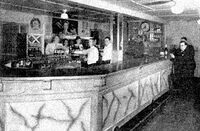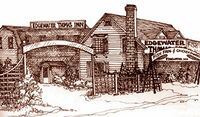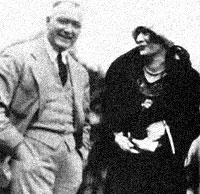The Rendezvous, television series pitch/Episode loglines
Based on The Rendezvous, screenplay, an unpublished feature script by Jason Carswell.
A logline (aka elevator pitch) is a one or two line plot summary.
First, the overarching series logline:
Respecting life, sacrifice, and a diamond treasure, The Rendezvous, a dramatic television series, centers around a fictional Black family's circumstances and drama across three generations working at a local historical roadhouse through three Windsor-Detroit intense events - rum-running of the 1920s, war-time riots of 1943, and the "peace"-time riots of 1967 in "Motown". Without being preachy or pedantic, issues like prejudice, domestic abuse, organized crime, fairness and ethics, personal autonomy, musical trends, and motor vehicles are fairly addressed and dramatized in evolving morals and culture across the decades.
The following episode outlines combined together may be considered the overarching series treatment - and/or an alternative 2024 treatment for The Rendezvous, screenplay.
Work in progress
At present, 12 or 13 episodes of about 10 minutes each (plus credits), would add up to 120 to 130 minutes - like a movie, but not.
Rather than directly adapt The Rendezvous screenplay, an unpublished feature screenplay by Jason Carswell, after many years of not looking at my script or copious notes I'm going to first outline (and maybe draft a longer treatment of) the story, in part from memory yet new in part, to fit this series format and dramatically limit the number of settings (and in preparation for a stage play version), to see what new gems may turn up before polishing begins. Instead of shooting around Windsor and Detroit, for this new economic revision (more appropriate for a stage play) locations have been reduced essentially to the family home, The Rendezvous roadhouse tavern, and a couple wide open exterior winter scenes. Both locations might simply be shot only as interiors, but could be improved by utilizing exteriors for shot diversity.
It's worth noting that through the eras, in addition to the family thread of principal characters (focused on in these outlines), are many reoccurring supporting roles, appearances, and background characters.
It's also worth noting that characters should not just be sitting around talking at each other, but many can be actively doing things, especially actions relevant to the era, particularly unfamiliar trends that have passed.
Historical accuracy
Great care was taken to have as few anachronisms as possible in developing The Rendezvous screenplay. In developing this television series we should try to avoid anachronisms as well, but may find more liberty in the oldest third taking place between 1922 and 1929, remaining undefined by not mentioning dates or precise current events.
The road now known as Riverside Drive East would have been a primitive road until it evolved from dirt to gravel then its current Tarmacadam surface, as would the road surface markings. Further local timeline research is required to apply to this story's three eras. Similarly, the interior and exterior of The Rendezvous Tavern evolved over time, as did the owners.
Copyrights
- Jason Carswell grew up on Lake St. Clair at 11080 Riverside Drive, half-way between Sand Point Beach and The Rendezvous Tavern at the border of Windsor and Tecumseh, Ontario (across the lake from Grosse Pointe).
- Jason Carswell developed this story over decades into this original fictional story based in a lot of anecdotal and factual research.
- Jason Carswell is obviously sharing this story online on his Projex.Wiki website.
- Jason Carswell does not have an army of lawyers to protect this intellectual property.
- Jason Carswell requests that anyone who "borrows" elements or further develops his content would contact and include him in their projects, lucrative or not.
If recollections are correct, after decades of consideration and research the first draft of The Rendezvous, screenplay was finally started in 2010 or 2011 in Windsor and Dwight, Muskoka.
It might be worth noting that The Rendezvous, screenplay has been mentioned countless times in passing on SaidIt, including here and here on 2019-06-18. My focus then was on Bittersweet Seeds, screenplay, which was clearly then as now, a far more important and necessary near-future cautionary tale to develop.
☑ Episode 1 - Sinking (1922 winter)
From the blustery winter outdoors, boys burst into The Rendezvous roadhouse tavern with alarming news.
Venturing out onto the frozen Lake St. Clair, the men and boys find a stuck old jalopy weighed down with whisky perilously in danger of plunging into the frozen depths.
Despite several attempts with different ideas, the subtle and not-so-subtle racist men in various states of sobriety finally free the vehicle to continue its smugglers' journey - thanks to the clever logical ideas of Cliff Sands, the (fictional) Black employee of the (historical) Rendezvous.
Through the door, "You won't believe what happened..."
☑ Episode 2 - Inciting (1943 June)
Through the door, "You won't believe what happened..."
We follow Cliff and Clay as they weave through the animated discussions at The Rendezvous. Topics include the ongoing world war, rising tensions at home, the many variables, circumstances, and escalating problems, as well as unfounded rumours circulating.
Some lads invite Clay to go along on a trip to Belle Isle to see first hand what all the hubbub is about. "Pack for war. Not that war."
Cliff insists he go along, "Just in case..."
☑ Episode 3 - Grinding (1967 July)
"Just in case..." Old Clay and friends are wishing Rocky luck as he prepares to head a potential job cleaning ducts at Ford's Casting Plant, 5 or 6 miles away.
"The daily grind is bad enough - but to work night shifts. And in the foundry!"
They talk about the state of things in Windsor, Detroit, the US, and Canada - assassins, automobiles, Black Panthers, civil rights, economics, leaders, the paradoxes of life, peace, and rising tensions - including with his abusive wife from Chatham. The guys have various reactions from humour to sympathy and offer unsought advice.
"Why did I even tell you?..."
Episode 4 - Conflicting (1922, 1943, 1967)
Within the same family home we see their kitchen upgraded over the decades.
☑ Episode 4a - Arguing (1922 winter)
"Why did I even tell you?..."
At home, Cliff's wife, Rose, incessantly challenges his manhood for failing to better stand up to the racists and get a pay raise.
Tensions rise.
She clips him with a cast iron pan and his response begins by smashing her head that creates a large hole in the kitchen wall as their children witness in horror.
Ruby, the girl and Clay, the boy...
☑ Episode 4b - Dishing (1943 June)
Same place, two decades later, same cinematic framing, Clay, the man...
...is being assaulted at home by his pregnant wife, furious that he's off "to have fun picking fights in another country" leaving her alone, suffering.
Tensions rise. Dishes fly and smash. Punches fly. Cliff steps in, "You can be a better man, and father, than I ever was." The children are watching.
Clay, the man, "We can talk about this later. We have to go."
☑ Episode 4c - Denying (1967 July)
Clay, the old man, "We can talk about this later. We have to go."
Rocky's wife is upset he didn't get the foundry job. In a similar move, she almost hits him with a frying pan, but impacts the wall. Clay is impressed watching his son, Rocky, maintain self-discipline.
"I won't. We have more important things to fight about."
She confesses that she's more concerned about him not coming back.
Clay and Rocky gather their things for the protest and leave - with musical instruments.
☑ Episode 5 - Warning (1922 winter)
Touring musician Fats Waller is tickling the ivories at The Rendezvous as patrons drink.
Some fellas are setting up an important meeting that will soon take place at The Rendezvous. "So I says to him, see, I says, 'Handy to be so near the river's current that'll sweep away your trash.' You see?" They also talk about their jeweler friends in Manhattan, their media connections, their influence, and the next big thing to invest in before the market explosion - diamonds. It's a sure thing, but is gonna take a couple years to manifest. [It actually takes a couple decades.]
Cliff serves other patrons whose discussion covers the troubled finances of the proposed bridge.
The boys Peter and Clay come down from the upstairs lookout to announce the looming arrival of police, but skeptics wonder if the boys are just saying that for the reward of fries - and then the wire-light alarms everyone into panic mode.
[ A Toronto financier hired to sell its securities instead stole the money, ran off and ultimately committed suicide in a jail cell after being convicted of murdering a drugstore clerk. The bridge boosters turned to Joseph A. Bower, a New Yorker who specialized in rescuing mismanaged companies. Bower succeeded in raising the necessary $12 million. “The only way things can be done today,” said Henry Ford, who backed the project, “is by private business.” The notion of private ownership for such a crucial piece of infrastructure was alarming to political leaders from the start. The mayor of Detroit, John Smith, sued to stop the project, but Detroit held a plebiscite in 1927, and voters favoured letting private funds build and own the bridge by a margin of 8 to 1. “I bow to the will of the people,” said mayor Smith. “They want a bridge and they must have a bridge.” ~ Macleans.ca: Land of the freeloaders: The battle for a new cross-border bridge, 2015-05-21 ]
☑ Episode 6 - Tensing (1943 June)
At The Rendezvous, the guys, and some women, plan their boat ride over to Belle Isle Park to see first hand what all the noise is about (and witness history).
Over food, accusations, inflammations, rumours, and a range of viewpoints are exchanged, but ultimately a consensus is reached and plans are outlined.
Progressively groups peel away to their boats. Cliff expresses unheeded concerns as the last group checks their weapons before leaving the roadhouse tavern.
☑ Episode 7 - Frustrating (1967 July)
The seeds of discontent are boiling over and folks are gathering at The Rendezvous to meet before heading to Detroit for a variety of reasons.
Many people voice many opinions.
None of our business. Stay out of that country's problems. Let them sort it out.
It's the Negros' fault. It's the Whites' fault. It's the establishment weaponizing culture in the classic Hegelian dialectic - problem, reaction, solution - and their solution is more centralized control and exploitation!
Some suggest blockading the bridge and tunnel. Some suggest watching the tanks from downtown Windsor, some want peace, and some just want to set the world on fire.
In the end, some discouraged go home, some motivated venture North to the USA, and some just sit, watch, and drink up...
[ The precipitating event was a police raid of an unlicensed, after-hours bar, known as a blind pig, on the city's Near West Side. It exploded into one of the deadliest and most destructive social insurgences in American history, lasting five days and surpassing the scale of Detroit's 1943 race riot 24 years earlier. Governor George W. Romney [father of Mitt] ordered the Michigan Army National Guard into Detroit to help end the disturbance. President Lyndon B. Johnson sent in the United States Army's 82nd and 101st Airborne divisions. The riot resulted in 43 deaths, 1,189 injured, over 7,200 arrests, and more than 400 buildings destroyed. ~ Wikipedia ]
Episode 8 - Drinking (1922, 1943, 1967)
☑ Episode 8a - Misbehaving (1922 winter)
Everyone pitches in to drink up, clean up, and mop up as the entire bar rotates to hide the blind pig in the wall while the fellas manage an unnoticed getaway.
Fats starts adlibbing what would become one of his famous tunes [The 1929 Ain't Misbehavin' will enter the American public domain on January 1, 2025.], as the police enter asking knowing questions that are only rewarded with fries, like the boys, along with a subtle bribe.
Some pontificate on the fact that so many otherwise law abiding citizens are peaceful smugglers and the ever-expanding government is just trying to control and exploit everyone. "No one believes in the legitimacy of corrupt systems."
After the police take their sweet time leaving, before re-setting the speakeasy bar, the bootleggers take flasks from their boots, "We need a drink!"
☑ Episode 8b - Heartbreaking (1943 June)
Bursting in, "We need a drink!"
Most of the boaters who left to Belle Isle Park return, some mildly wounded, and some only stay briefly before heading home, to work, or elsewhere.
Having witnessed the beginning of the riot, different folks have different reflections, perspectives, and opinions on things. Rumours and war stories abound.
All the while Cliff, has not been doing well, clutching his left arm - since the tense conflict on the island. His health takes a turn for the worse and a doctor is sent for.
Gasping for Clay, Cliff manages to sputter out, "The kitchen... the wall...," before passing out as Clay misinterprets his meaning.
☑ Episode 8c - Singing (1967 July)
[Post-cliffhanger:] "You Keep Me Hangin' On*, from the girls about Motown. Thank you! Folks, The Supremes will take a short break and be back with Love Is Here and Now You're Gone*.
"I saw you win the [Detroit/Windsor] Freedom Fest in '60!" "They performed supremely."
Drama ensues as a drunken Florence Ballard shows up to confront Diana Ross, Mary Wilson, and the new member, Cindy Birdsong, about kicking her out of the group as well as the recent name change to "Diana Ross & the Supremes".
They finally convince her to go not even a mile up the road to the house on the lake where they always stay the night, asking Clay's son, Rocky, to escort her there safely.
A racist gets put in his place. Everyone is on edge. The riot is not yet over. Horror stories trickle in. The future is uncertain. People are trying and failing to relax.
"And now - The Supremes' newest track, out any day now... Reflections*!" [ As the cliffhanger closing. ]
[ * Copyrighted songs can be mentioned, and perhaps the rights to play them can be obtained. ]
[ Potential dialogue: - More puns: "You can't hurry, love." - Intentional anachronisms with Member Berries of future hits: "Love Child", "Ain't No Mountain High Enough", "Do You Know Where You're Going To?" ]
☐ Episode 9 - Thriving (1800s)
[ Optional bonus 1800s episode. ]
- Echos of Reflections, perhaps in melody, perhaps in lyric, perhaps the record? - Family tree tapestry in their living room - 1812 - Underground railway - US Civil War - North worse than the South - Canada often just as bad - Blacks stealing and undercutting jobs of Whites - survived none the less, in settlements specifically established for escaped slaves - communities thrived (ie. Chatham, Dawn, Elgin, Wilberforce, etc.)
"Thanks a lot."
☑ Episode 10 - Tanking (1967 July)
"Tanks. A lot. All over downtown Detroit."
Clay, Rocky, and the rest have just returned to drop some folks off, pick others up, eat, rest, restock, and prep to go back in solidarity.
"Okay smart guy, what's your grand solution you've been working on."
"You might think it's naive, but I've been thinking on it a while and it's the best I can come up with. FOEPATCHISM. Yes. Foe Patch Ism. It stands for Fair, Open, Ethical, Peaceful, Accountable, Consistent, Honest, Inclusive, Social Management. It could work for collaborators, communities, families, governments, groups, homes, media, organizations, societies, teams, workplaces, etc. To the point, it's ethical community management, with the emphasis on voluntary ethical communities rather than controlling management."
"Impossible, peacenik."
"Not if you start with the media and counter-propaganda."
"Agitprop?"
"No, not for agitation. For greater harmony. The medium is not the only message. Almost anything can be weaponized, and almost anything can be utilized for good. We don't even need control or a strong signal - if it resonates strongly with people they will spread the frequency, man."
"You've almost got even me convinced."
"Look, I've not only been reading up on them but the Black Panthers are setting up a Detroit branch. No, they're not the violent people the liar media is saying. You've seen how they're covering this riot. They only spin and misrepresent and lie. If the Black Panthers are so bad why do they focus so much on giving free breakfasts to Black children - and why is the government trying to stomp on that - and thriving communities?"
"Okay folks. Two hours and we go back. This is a happening. Meanwhile feel free to read Isaiah 21:5-9, all along the watchtower."
"Interesting. I think a thunderstorm's coming."
"Who you?"
"Bob. I was supposed to play tonight."
"Ah. Dylan. I've seen you. I mean... My wife saw you live. You're always welcome in the righteous resistance."
"Sure man, but I'm just passing through. A low key stop on my way back home to two babies and the wife."
Someone reads quotes from the papers about the riot.
Crying people...
☑ Episode 11 - Lamenting (1943 June)
Crying people...
The Rendezvous is hosting the wake for Cliff Sands where people express their sentiments, stories, and regrets about the trip to Belle Isle, follow up details about the riot they missed, the trauma of those riots, the outcomes, and overall despondence at the chaos raging in the wider World War II.
"Is there any hope left for this world?"
"Sure, there's always room for improvement. Things here may seem dark, but overall things are getting better. Just think of where we've been..."
☐ Episode 12 - Rendezvousing (1922 winter)
"Where you been?"
- Gangsters rendezvous
-
Silence.
Episode 13 - Generating (1922, 1943, 1967)
☑ Episode 13a - Healing (1922 winter)
Silence.
Through the soft thick snowfall Cliff trudges home alone, in the dark.
Cliff finishes patching up the wall, he quietly tidies the kitchen, and puts his tools away.
Cliff slips into bed, Rose rolls over, and they embrace in silence.
Sins are forgiven.
☐ Episode 13b - Enriching (1943 June)
- awaken - real riches
-
+ cliffhanger
☐ Episode 13c - Shining (1967 July)
- Diamonds!
-
+ cliffhanger
Reference
Wikipedia links, unless otherwise noted:
- Detroit–Windsor
- Michigan Central Railway Tunnel, 1906-1910
- Ambassador Bridge, 1927-1929+
- Macleans.ca: Land of the freeloaders: The battle for a new cross-border bridge, 2015-05-21
- Detroit–Windsor tunnel, 1928-1930+
1800s plus
1922
- Ain't Misbehavin' (song)
- "Ain't Misbehavin'" is a 1929 stride jazz/early swing song. Andy Razaf wrote the lyrics to a score by Thomas "Fats" Waller and Harry Brooks for the Broadway musical comedy play Connie's Hot Chocolates (opened June 20, 1929). As a work from 1929 with its copyright renewed, it will enter the American public domain on January 1, 2025.
- Boardwalk Empire, an HBO television series, 2010-2014
- Diamond#Gem-grade diamonds, are a controlled centralized trade artificially inflating the value of a semi-precious gem through marketing
- Engagement ring#20th century, 1938+
- De_Beers#Marketing, 'A Diamond is Forever', 1947
- Diamonds Are a Girl's Best Friend, song in Gentlemen Prefer Blondes the 1949 musical and 1953 movie
- Diamonds Are Forever (1956 novel)
- Diamonds Are Forever (1971 film)
- Jewish-American organized crime
- Joseph Zerilli
- Meyer Lansky, oddly doesn't mention anything about his government and CIA connections
- Murder, Inc.
- Racketeering
- The Purple Gang, aka Sugar House Gang
- Prohibition#North America
- Prohibition in Canada
- Prohibition in the United States
- Rum-running
- Speakeasy, aka blind pig or blind tiger
- Teetotalism
- Riverside, Ontario#Historical and the Grand Taverns of Riverside:
- Edgewater Thomas Inn
- Island View Tavern (known as Abars)
- Lauzon Stop House
- Menard's Tavern
- Rendezvous Tavern
- Wolf's Hotel
- Pub#Roadhouse
1943
- 1943 Detroit race riot, Sunday June 20 - Tuesday June 22, 1943
- Belle Isle Park
- MacArthur Bridge (Detroit), 1923+, replaced an iron bridge with wooden decking that accidentally caught fire and was destroyed in 1915. The bridge, popularly known as the Belle Isle Bridge, was originally named the George Washington Bridge and renamed the Douglas MacArthur Bridge after General Douglas MacArthur in 1942.
- Detroit Diesel Series 71, 1938–1995
- Fats Waller, 1904 - 1943-12-15
- Harry Houdini#Death, (1874 - Halloween 1926)
- Naval Air Station Grosse Ile, 1929 - 1969
1967
- 1967 Detroit riot, Sunday July 23, 1967 - Thursday July 27, 1967, aka The 12th Street Riot
- "Black Day in July" – 4:10 - Side 1, Track 3 on the album: Did She Mention My Name?
- By Gordon Lightfoot on YouTube
- Covered by The Tragically Hip on YouTube
- "Black Day in July" – 4:10 - Side 1, Track 3 on the album: Did She Mention My Name?
- Civil rights movement, 1954 - 1968
- Civil rights movement in popular culture
- List of civil rights leaders
- Malcolm X, 1925 - 1965-02-21
- Martin Luther King Jr., 1929 - 1968-04-04
- List of peace activists
- Detroit Renaissance
- Renaissance Center, 1973 - 1977+
- The Supremes
- - Featuring three group members who were marketed for their individual personalities (a move unprecedented at the time) and Diana Ross's pop-friendly voice, the Supremes broke down racial barriers with rock and roll songs underpinned by R&B stylings.
- - By 1967, Ballard would not show up for recording dates, or would arrive at shows too inebriated to perform.
- - On June 29, 1967, the group returned to the Flamingo Hotel in Las Vegas as "Diana Ross & the Supremes". The first two days of the Flamingo engagement went by smoothly. On July 1, when reporting for makeup and wardrobe before their first show of the evening, Ballard discovered an extra set of gowns and costumes that had been brought along for Cindy Birdsong. Angered, Ballard performed the first concert of the night inebriated, leading to an embarrassing on-stage incident in which her stomach was revealed when she purposely thrust it forward during a dance routine. Enraged, Gordy ordered her back to Detroit and permanently dismissed her from the group. Birdsong officially assumed her place during the second July 1 show.
- The Supremes#Impact
- Diana Ross & the Supremes: The No. 1's
- (1964-06-17) Where Did Our Love Go #1
- (1964-09-17) Baby Love #1
- (1964-10-27) Come See About Me #1
- (1965-02-08) Stop! In the Name of Love #1
- (1965-04-15) Back in My Arms Again #1
- (1965-10-06) I Hear a Symphony #1
- (1966-07-25) You Can't Hurry Love #1
- (1966-10-12) You Keep Me Hangin' On #1
- (1967-01-11) Love Is Here and Now You're Gone #1
- (1967-03-20) The Happening (song) #1
- (1967-07-24) Reflections (The Supremes song) #2
- (1968-09-30) Love Child (song) #1
- (1968-11-21) I'm Gonna Make You Love Me #2
- (1969-06-13) Someday We'll Be Together #1
- (1970-10-15) Stoned Love #7
- (1970-07-16) Ain't No Mountain High Enough #1
- (1973-05-03) Touch Me in the Morning (song) #1
- (1975-09-24) Theme from Mahogany (Do You Know Where You're Going To) #1
- Detroit dramas
- Detroit history
- Filmmaking
- Historical drama
- Independent media
- Loglines
- Media alternatives
- Media ideas
- Media projects
- Original content
- Pitches
- Production development
- Projects started on 2023-03-06
- Stories set in the 1920s
- Stories set in the 1940s
- Stories set in the 1960s
- Television
- Television series pitches
- The Rendezvous
- The Rendezvous, television series pitch
- Windsor communications
- Windsor dramas
- Windsor dramatic productions
- Windsor entertainment
- Windsor history
- Windsor indie-media
- Windsor media
- Windsor prepper projects
- Windsor video productions
- Windsor videos




